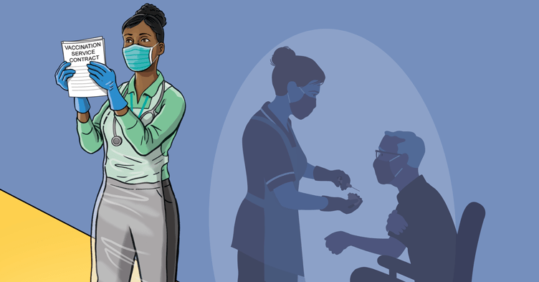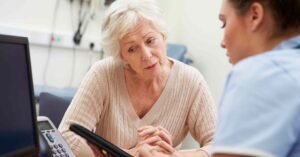Primary care and community nurses: the forgotten frontline

Primary care and community nurses are integral to the healthcare system and the fight against Covid-19. But their importance is being overlooked
General practice was thrust into the spotlight in December last year as surgeries started to receive Covid-19 vaccinations for the NHS’s biggest ever inoculation programme. Primary care will be running local vaccination services and going to people who are unable to attend the sites, such as those in care homes. General practice has joined critical care units as the front line in the fight against Covid.
The Government aims to vaccinate 15 million people by mid-February, and millions more by spring. But this huge task will be impossible without practice nurses, who normally organise, manage and deliver vaccination programmes. While GPs may be more involved this time, practice nurses will still administer or oversee the vast bulk of the Covid-19 jabs. But when the media or authorities talk to or about general practices they turn to GPs.
When announcing the massive flu vaccination programme last summer, health secretary Matt Hancock seemed to suggest he was passing legislation to allow nurses to administer jabs, although they have been doing this for decades. ‘We have changed the law so that more people can administer the jab. We want pharmacists, nurses and GPs to be able to administer it,’ he said.
On 6 November, the direct enhanced service – an opt-in, nationally negotiated service over and above those provided under usual contracts – for general practice to deliver the Covid-19 vaccine was published. Nursing in Practice revealed the Royal College of Nursing (RCN) was not consulted on the agreement between the British Medical Association (BMA) General Practitioners Committee in England, NHS England and NHS Improvement.
Prominent nurses were concerned that the nursing voice was missing. Professor Alison Leary, chair of healthcare and workforce modelling at London South Bank University, told Nursing in Practice at the time that NHS England ‘would have been wise to consult GPNs about the logistics of this rollout’ and that it is ‘concerning they did not’.
Covid-19 has magnified a long-standing frustration among practice nurses: despite their expertise, many do not feel listened to, recognised or appreciated. Their issues with variable terms and conditions, with wildly differing pay and holiday, remain unaddressed.
They are also noticeably absent from key primary care leadership positions. Research from the Queen’s Nursing Institute (QNI) in 2016 found just 1.6% of practice nurses were partners in their practices. This lack of appreciation of practice nurses is one reason why Nursing in Practice launched the Nursing Stars campaign to celebrate the amazing work of practice and community nurses, and midwives, during the pandemic.
So how are practice and community nurses feeling right now? And what are the consequences of them not being listened to?
Being undervalued

QNI chief executive Dr Crystal Oldman says if practice nurses had been listened to at the start of the rollout they might not have had to complete 18 training modules to become Covid vaccinators, including one on preventing radicalisation. NHS England has now said this bureaucracy has been cut but it was putting nurses off returning to practice for sometime.
Related Article: NHS 10-year plan: What does it mean for nursing?
Dr Oldman added: ‘I’ve had colleagues who have given up. They said “I can’t do it. I’ve already spent 20 hours on it. And I’m a registered nurse who wants to safely give vaccines. Why do I need a counter-terrorism module?,’’’ Marilyn Eveleigh, nursing adviser to Nursing in Practice, highlighted the same problem in an opinion piece. The huge level of documentation was mostly of ‘low relevance and is deterring colleagues at a time when they are desperately needed’, she says.
The pressure group Fair Pay For General Practice Nursing launched a survey in October 2020 on the terms and conditions of GPNs. The survey is still live and has had more than 1,200 respondents so far. One of the authors Ann Gregory says the results are showing practice nurses are feeling ‘not valued’, ‘disrespected’ ‘disgusted’, ‘stressed’, ‘unappreciated’, ‘exhausted’ and ‘discriminated against’.
In a blog for Nursing in Practice, Ms Gregory writes: ‘Throughout the Covid-19 pandemic, the GPN has provided face-to-face, frontline care for their patients. We have been delivering life-saving screening, chronic disease care, contraception and immunisation services, as well as planning and advising colleagues on safe practice and infection prevention. So why is the GPN invisible, rarely mentioned in news reports?’
‘In big trusts, there are people who keep an eye on the workforce and thank them, but we don’t have that, especially with practice managers so overrun.‘
Indeed, Covid vaccination is not the only recent work nurses need recognition for. Before that, they were instrumental in the biggest ever influenza campaign in UK history. They have also been working incredibly hard to catch up on clinical work missed during the first lockdown, such as smear tests and long-term condition reviews.
Caroline (not her real name), a practice nurse in Cornwall, explains that she and her colleagues feel they have risen to the challenge but have not received thanks from their employers. ‘We’re above and beyond our flu targets, probably double, yet my managerial team tells me we’re still not seeing enough patients.’
Terms and conditions are a long-simmering grievance among practice nurses, one that has bubbled up again during Covid-19. Practice nurse contracts are made with the employing GP, so terms and conditions such as sick pay can be highly variable between practices and even within the same practice.

Nursing in Practice reported in October that some GPNs did not receive full pay when they self-isolated because of Covid-19, particularly early in the pandemic. Caroline says: ‘Covid has highlighted our poor terms and conditions. When sick pay isn’t always properly given, or we work bank holidays, but are still not listened to, we begin to think what’s the point?’
Robana Hussain-Mills, a practice nurse and deputy clinical director at Nottingham City East primary care network (PCN), says: ‘Practice nurses are in a room on their own doing their job day in and day out without hearing much from the rest of the healthcare service or having much visibility. There’s no thanks, there’s no recognition. In big trusts, there are people who keep an eye on the workforce and thank them, but we don’t have that, especially with practice managers so overrun.’
Ebbing morale
Ms Hussain-Mills says morale among practice nurses is worse than ever. And this is from a pretty low baseline. QNI figures from 2016, the latest data available, show two-thirds of GPNs believed they were underpaid and a third planned to retire in the next five years. ‘At the moment, all you hear about is GPs and not GPNs,’ she says. ‘The initials for general practice are the same for as those for general practitioners. When you’re talking about GP land, people just think you’re talking about general practitioners.’
‘I’m tired of practice nurses being forgotten about and not valued.‘
Ms Hussain-Mills says workloads have been ‘relentless’ and emotionally draining. ‘Patients are struggling with mental health problems, losing their jobs and not being able to feed their families. They come to you with that emotional burden and you also have to take care of the physical aspects of their health.’
Helen Donovan, RCN professional lead for public health, says primary care nurses need recognition for their work. ‘Nursing staff are already central to the rollout of the Covid-19 vaccination programme.’ They are ‘vital to the successful delivery of the vaccination,’ she explains. ‘They should be given huge credit for their professionalism, at a time when nursing is under such unprecedented pressure.’
Caroline says: ‘I’m tired of practice nurses being forgotten about and not valued. I think practice nursing has gone back 30 years during the pandemic. It’s as if we are expected to be GPs’ handmaidens.’
She adds: ‘You barely hear the words practice nurse mentioned [by the Government or media] when it comes to Covid vaccinations. I’m feeling very disillusioned as a result, given we work so hard to deliver them.’
Possible consequences
Related Article: How could future nurses use robots to help deliver care?
Caroline tells Nursing in Practice that ‘for the first time ever’ she is considering retiring at the earliest opportunity, when she turns 55 in two years’ time, because of how undervalued she has felt during the pandemic. For her, delivering the Covid-19 vaccine has been deflating rather than empowering.
Ms Hussain-Mills says: ‘I wouldn’t be surprised if we see practice nurses burn out.’ Issues such as standardised contracts have ‘always been in the background’, she adds. ‘This is a time for change. We need to speak to people like the BMA and NHS England and NHS Improvement primary care medical director Dr Nikki Kanani. That’s where the power lies.’ NHS England primary care nursing lead Karen Storey said in 2019 that work was being done on GPN terms and conditions.But NHS England had not responded to Nursing in Practice’s enquiries about an update to this work.

However, this is not to say that nurses are not recognised. On 4 January, chief nursing officer for England Ruth May tweeted her thanks to GPNs for their ‘work at the very heart of the vaccination programme’, which was well-received in the community. And not all PCNs and practices are ignoring the voice of practice nurses. Kim Ball, lead practice nurse at a surgery in Bristol, says her role has allowed her to contribute at PCN level. She explains: ‘I’m a lead nurse, so I am involved at PCN level with the vaccination programme. I’ve been able to act on behalf of nurses and speak up for them so that it’s not GP dominated,’ she says. ‘Without that, I don’t think nurses’ voices would be heard as well in my area.’
Nottingham GP and BBC Breakfast regular Dr Jamie Parker thinks nurses would benefit from being featured in the media more regularly. ‘When I started out on BBC Breakfast, it was pointed out on social media that there was a lack of practice nurses on the programme,’ he says. ‘It’s about getting visibility.’ And, he adds, practice nurses have been vital in the fight against Covid: ‘I am deeply grateful for their help and bravery keeping things going. We couldn’t have done it without them.’
Ms Donovan says practices need the appropriate levels of funding to ensure enough nursing staff for the Covid vaccine programme. ‘The continuing rollout will be a huge undertaking and there must be enough resource, including funding and clinical staff,’ she says.
Dr Oldman says: ‘Nurses need to be listened to so that solutions can be found to real practical issues. It’s not about us versus them. It’s about valuing knowledge and skills.’
‘Nurses are the vaccinations experts,’ she adds.
Community nurses: the Cinderella service
When ITV reported that care workers were doing more work because district nurses were unable to see patients during the coronavirus crisis, there was uproar among district nurses – who had, in fact, continued to visit patients during lockdown. The channel issued a correction. Community nursing teams are facing unprecedented workloads, particularly in palliative and end-of-life care.
And they, like practice nurses, are not getting the recognition they deserve. District nurse team leader Ellie (not her real name), in Somerset, felt so stressed by the rise in workload she took a pay cut of around £7,500 a year and moved to another job without leadership responsibilities.
She was originally planning to stay in her role until retirement. ‘The expectations of the trust were getting too much,’ Ellie explains. ‘The demands are too high. You begin to think, ‘Do I really want to work at this speed throughout the whole of winter?’
She adds: ‘Previously, I could have gone months without a “thank you”, but the demands during Covid are so high, it would have been nice to be appreciated. Also, it feels like the public perception of our role hasn’t improved despite everything we’re doing during Covid. They feel everything takes place in hospitals.’
A paper published last December by the British Journal of Community Nursing revealed the ‘substantial rise in the number of people dying at home’. End-of-life caring during Covid-19: opportunities and challenges for community nursing noted that district nurses were caring for more dying patients.
Related Article: What we do and don’t know about practice nurses being added to ARRS
One of the study authors Dr Crystal Oldman, chief executive of the Queen’s Nursing Institute (QNI), says there are accounts that some community teams have a third of staff off sick or isolating because of the rapid transmission of the new Covid-19 strain.
Another of the study authors, Ben Bowers, a Queen’s Nurse and PhD student at the University of Cambridge researching palliative and end-of-life care, explains to Nursing in Practice that ‘hospital is the last place’ many people want to be during a pandemic because ‘they don’t want to get Covid and don’t want to swamp the NHS’.
This means community services are ‘going out of their way’ to provide the additional care. ‘Community nursing has been described as one of the NHS Cinderella services, with brilliantly skilled nurses who are not really recognised,’ Mr Bowers says.
Community nursing was under-resourced before the pandemic, he says, which ‘didn’t put us in a good place to deal with it’. He suggests the Government focuses on hospitals, such as the Nightingale hospitals, because they are highly visible. But he adds: ‘We’re not going to get out of this pandemic by focusing on hospitals alone. It would be good to see [the work of community nurses] come into the political narrative and get wider recognition’.
Click here for Nursing in Practice’s editorial on recognising practice and community nurses.

See how our symptom tool can help you make better sense of patient presentations
Click here to search a symptom


When sick pay isn’t always properly given, or we work bank holidays, but are still not listened to, we begin to think whats the point?



